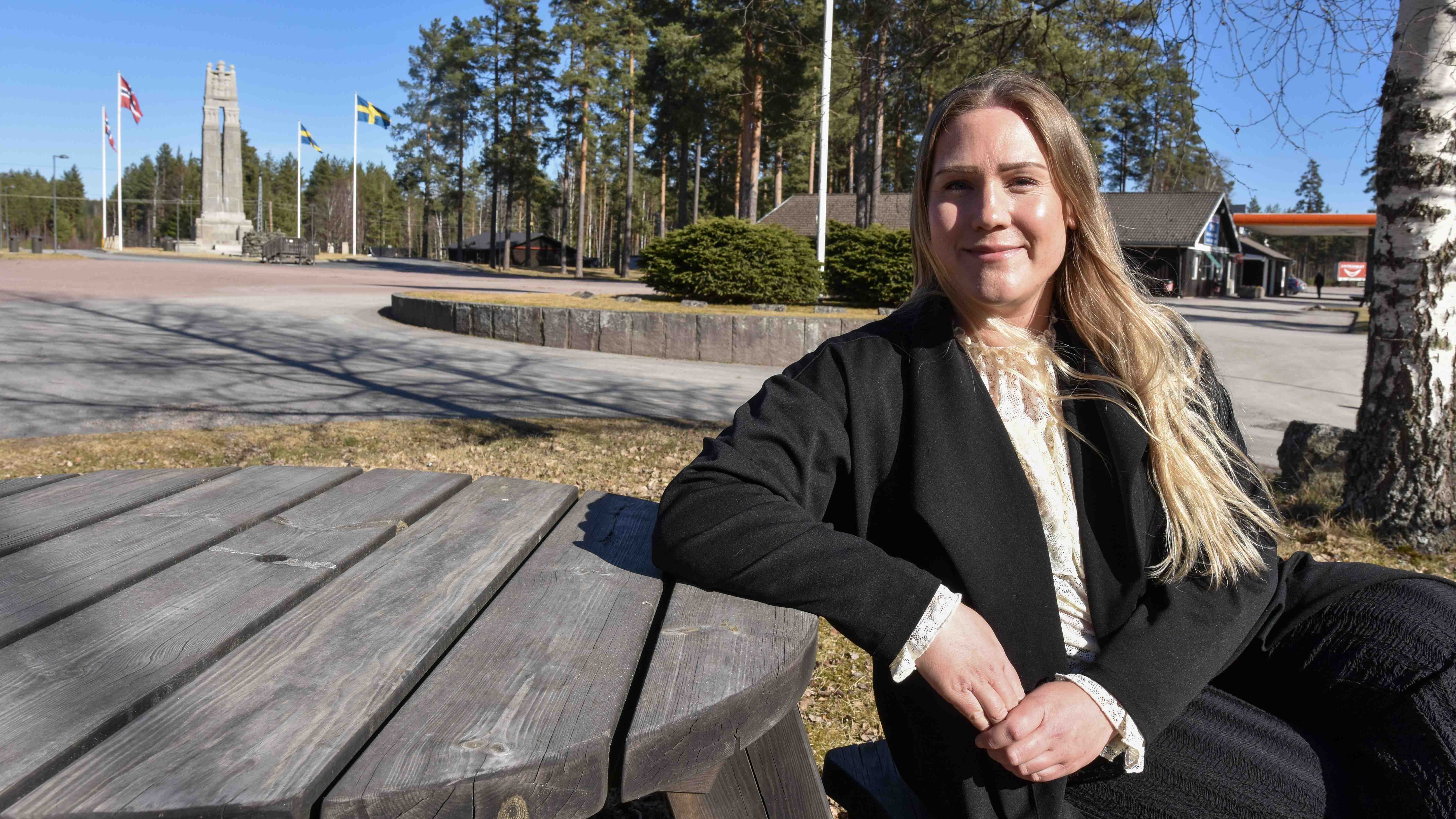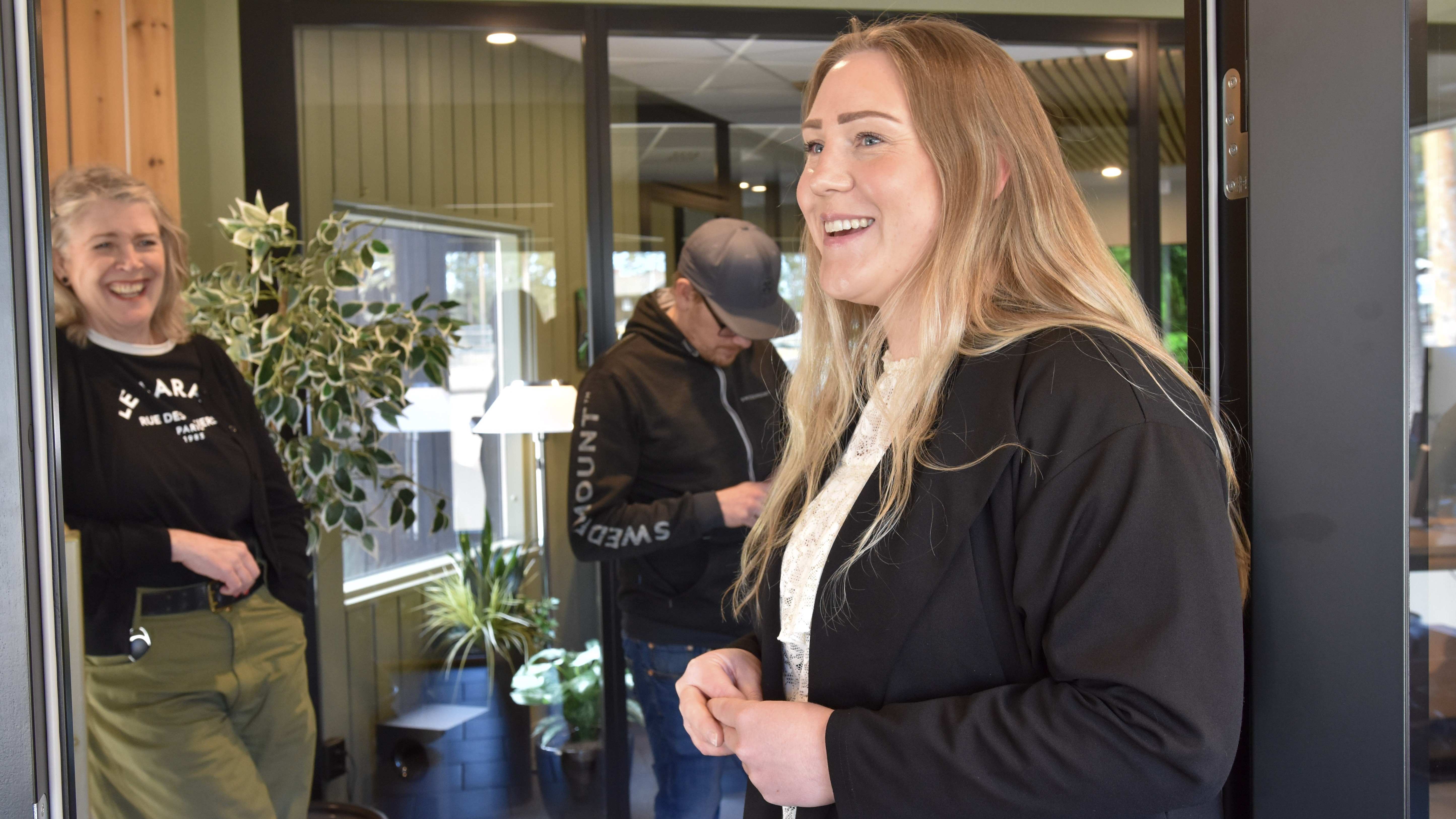Swedish Sofia is a nurse in Norway – wants simplified rules
Swedish Sofia Krogh is happy in her job in Indre Østfold municipality in Norway. The pay and pension scheme are good, and her colleagues are nice. Nevertheless, the nurse has considered leaving her job in her neighbouring country several times. The paperwork is demotivating.
Sofia Krogh is a Swedish citizen and lives in the border municipality of Eda in Sweden. She trained as a nurse in Norway. Krogh has worked in the health service in both countries.
“It is challenging at times with many rules and paperwork to fill in. There are many grey areas,” says Krogh.
The Nordic Labour Journal meets her for a chat about how the common Nordic labour market actually works for an employee. Our rendezvous is at Morokulien, situated right on the border between Norway and Sweden.
In Morokulien, you can also visit Grensetjänsten Norge-Sverige (the Border Service Norway-Sweden). It is an information service and Norwegian-Swedish government cooperation that provides information about work, pensions, taxation and rules for setting up a business in the neighbouring country, and about life along the Norwegian-Swedish border.
Norway as the nearest neighbour
Sofia Krogh grew up in Skillingmark in Eda municipality, Värmland county.
“We had Norway all around us,” says Krogh. Eda municipality borders Eidskog municipality in Norway.
Krogh says they would go shopping in Norway as easily as in Sweden while growing up. They would choose what was closest. She had Norwegian and Swedish friends.
“We never saw the border as an obstacle, not physically nor mentally,” says Krogh.
Studying in Norway
When Krogh chose her place of study, she decided on Kjeller in Norway. It was a one-hour drive from her home to the university. The alternative was to study in Karlstad.
“The main reason for studying in Norway was that Kjeller is closer than Karlstad. For me, that journey would have been twice as long.”

Sofia Krogh grew up in Sweden with Norway as her closest neighbour in all directions and feels it is as natural to study and work in Norway as in her home country.
She says there were no problems for a Swede to study in Norway. When she graduated, she was authorised to work as a nurse in both countries.
Krogh lived in Eidskog in Norway from 2009. She and her partner at the time had a son. When they separated, they shared custody of the child.
Krogh moved back to Sweden in 2016. Her son would stay in Norway one week and in Sweden the next. He could still carry on going to a Norwegian school, as the distance between the two homes, municipalities and countries was not far.
“It was no problem at all, but the Covid-19 pandemic made everything very difficult,” says Krogh.
Everything shut down. Including the border. What used to be a given – for instance driving her son back and forth across the border every day – became illegal.
The story of how Krogh fought to see her son during the pandemic and how this was finally solved, was covered by several national media outlets during the pandemic.
The challenges of being a cross-border commuter
Krogh used to be a cross-border commuter, living in Eda municipality in Sweden while working in Eidskog municipality in Norway.
There are separate rules for employees who are cross-border commuters. In effect, you become your own employer. Among other things, you’re responsible for managing your own taxes – working out how much tax you need to pay and making advance tax payments yourself.
“There is a lot to get your head around, and it is not easy to do it right. I was working odd hours and did not necessarily earn the same every month. It was difficult to calculate my tax.
“It felt a little like playing Russian roulette: Have I paid enough tax or not? It was a constant, inner mental stress. I was thinking about it a lot. But I managed OK most of the time, except the one time I got hit with a 60,000 kroner tax bill.”
Krogh believes it would be easier to recruit staff to the health and care sectors on both sides of the border when staff shortages necessitate this, if rules were simpler.
“I know Swedes who fancy working in Norway but who don’t dare because of the language and because of the many rules you have to adhere to,” says Krogh.
Becoming a cross-border commuter again does not appeal to her.
“I could easily have worked in one of the border municipalities in Norway. It would have meant a shorter commute, but I can’t be bothered with all the hassle,” she says.
It pays to work in Norway
Krogh was working in the ambulance service in Årjäng municipality in Sweden when the pandemic hit. She was also taking extra shifts doing home visits in Eidskog in Norway. But during the pandemic, she was no longer allowed to take such shifts.
“That was sad. I had been working there for a long time and felt I had to quit a safe job that I enjoyed doing,” she says.
Krogh worked for the Swedish ambulance service until last autumn, when she decided to do something else. She applied for a job across the border again and started working as a nurse in Indre Østfold municipality. This municipality does not border Sweden, which means Krogh is not by definition a cross-border commuter, just an “ordinary” employee.
For Krogh, working in Norway means good money.
“I have a 56 per cent position in Norway and get paid the same as I would in a full-time position in Sweden. It’s a shame, but that’s the way it is.”
Wages and pensions are the main reasons why many Swedish nurses look for work across the border.
“All the benefits are much better in Norway than in Sweden, at least for us nurses,” she says.
Krogh also highlights some of the Swedish system’s advantages, including more days of self-certified leave when your child is ill.
Happy to be working in Norway
Krogh says a fair few of her colleagues in Norway are Swedish.
“I like the mentality in Norway, it is generally more relaxed. We have good staffing levels for nurses at work. In my experience, this is a bigger challenge in Sweden than in Norway.”
She is very happy to be working in Norway.
“But it does come with certain challenges,” she says.
Employers do not ask or appear particularly interested in how she, as a Swedish citizen and employee in Norway, solves the paperwork.

Sofia Krogh has had good help from staff at Grensetjänsten Norge-Sverige in Morokulien. From the left: Kikki Lindset and Oskar Danielsson.
Where do you belong?
The A1 certificate is one of the important papers these days. This document proves which country’s social security system you belong to. It determines where you must pay social security contributions and what benefits you are entitled to, such as sick pay and pension.
With a job in Norway, Krogh is part of the Norwegian system. When her old employer in Eda municipality called her to ask for help, she thought yes, she wanted to do that, and she had the time. The extra money would also be a welcome bonus.
She took on a few shifts over a few months.
That resulted in Swedish authorities giving her 100 per cent affiliation to the Swedish social security system.
So what then about her Norwegian affiliation? And what would happen to the rights she had earned in Norway? Might she risk losing her Norwegian pension, for instance?
“I could take even more shifts at my old workplace. They needed people. But I don’t dare because it might have an impact on things like my pension rights in Norway.”
Should be simpler
Krogh has contacted Grensetjänsten Norge-Sverige in Morokulien several times and has been given good advice and help.
“There are many unanswered questions and grey areas, but the employees at Grensetjänsten do this every day and have a lot of knowledge and experience when it comes to how the rules and regulations work. I’ve had incredibly good help from them,” says Krogh.
She thinks it is a shame that the systems are so complicated that people lose their motivation to work across the border.
“It is desperately sad,” says Krogh.
She urges the authorities to work towards dismantling the border obstacles.
“It simply must be possible to make some of this a bit simpler?”
- Too difficult to cross the border
-
Sofia Krogh from Sweden thinks complicated rules stop more people from travelling across the border to Norway to work.
- Some of the border rules
-
Tax for cross-border commuters
Cross-border commuters are people who live in a Norwegian municipality that borders Sweden and who work in a Swedish municipality that borders Norway. The municipalities do not have to border each other. Cross-border commuters are covered by separate tax regulations.
To be defined as a cross-border commuter, you must regularly spend at least two days a week (with overnight stays) at your permanent residence in Norway. Cross-border commuters are only required to pay income tax in Norway.
If you are a cross-border commuter, you pay social security contributions on your salary to Sweden and income tax on your salary to Norway.
Living in Sweden, working in Norway
If you work solely in Norway, your employer will deduct a national insurance contribution. This fee entitles you to Norwegian pension rights and sick pay.
In return, you are exempt from paying the general pension contribution in Sweden and can claim a deduction for the national insurance contribution in your Swedish tax return. Normally, you must pay your advance tax yourself.
 Follow us on Facebook
Follow us on Facebook
